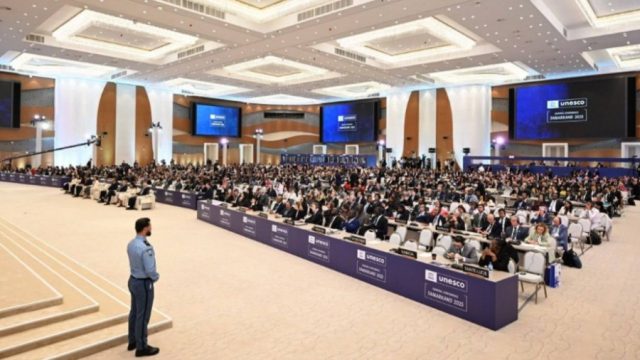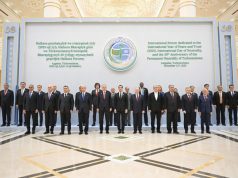Uzbekistan’s cultural revival and leadership in global heritage, education, and science take center stage
SAMARKAND, Friday, October 31, 2025 (WNP): The ancient Silk Road city of Samarkand has made history by hosting the 43rd session of the General Conference of the United Nations Educational, Scientific and Cultural Organization (UNESCO) — the first time in the organization’s 40-year history that its highest governing body convenes outside its Paris headquarters.
The landmark event is widely seen as international recognition of New Uzbekistan’s growing global stature, its leadership in preserving humanity’s shared cultural heritage, and its expanding role in fostering intercultural and humanitarian cooperation.
Described as a “crossroads of civilizations,” Samarkand’s selection as host city embodies UNESCO’s founding ideals of dialogue, tolerance, and diversity.
The setting also mirrors Uzbekistan’s domestic vision — a “Third Renaissance” movement promoted by President Shavkat Mirziyoyev, focused on advancing education, science, and cultural development.
Since joining UNESCO in 1993, Uzbekistan has emerged as one of the organization’s most active members. The UNESCO Office in Tashkent, established in 1996, has served as a hub for collaboration in education, science, culture, and communication. Frequent exchanges between Uzbekistan’s leadership and UNESCO Director-General Audrey Azoulay have further strengthened this partnership in recent years.
Uzbekistan has twice served on UNESCO’s Executive Board (1997–2001 and 2009–2013) and currently holds a seat on the Intergovernmental Committee for the Safeguarding of Intangible Cultural Heritage (2022–2026). A new four-year cooperation framework (2022–2026) is now being implemented to advance projects in key sectors.
Uzbekistan’s cultural legacy features prominently in UNESCO’s heritage initiatives. Seven sites in the country — including the Historic Centre of Bukhara, Itchan Kala, and Samarkand: Crossroads of Cultures — are inscribed on the World Heritage List.
Equally significant is Uzbekistan’s success in safeguarding its living traditions. Sixteen elements, from Shashmaqam music and Bakhshi storytelling to plov cuisine and Navruz celebrations, are recognized on UNESCO’s Representative List of the Intangible Cultural Heritage of Humanity.
Uzbekistan’s dynamic cultural diplomacy has also taken shape through major festivals jointly organized with UNESCO, such as Sharq Taronalari (Melodies of the East), the Maqom Art Forum, Atlas Bayrami, and the Lazgi Dance Festival in Khiva — establishing the nation as a vibrant center of cultural dialogue across Eurasia.
Education and science have become new frontiers in the Uzbekistan–UNESCO collaboration. The country now hosts eight UNESCO Chairs and 24 Associated Schools, with Tashkent and Fergana joining the Global Network of Learning Cities. A new UNESCO Chair in Sustainable Historical Tourism was established in 2024 at the International University of Tourism and Cultural Heritage “Silk Road” in Samarkand.
Uzbekistan also plays an active role in UNESCO’s scientific programs, particularly in environmental conservation and water diplomacy. Its Chatkal and Lower Amu Darya biosphere reserves form part of UNESCO’s World Network of Biosphere Reserves.
A major milestone in 2024 was the launch of the UNESCO–Uzbekistan Abu Rayhan Beruni International Prize for research in Artificial Intelligence Ethics, with the first award ceremony scheduled during this year’s General Conference in Samarkand.
Uzbekistan has been instrumental in advancing several key UNESCO resolutions, including the “Khiva Process: Promoting International Cooperation in Central Asia” and the “Tashkent Declaration on Universal Access to Information.” These initiatives highlight the country’s role as a bridge between cultures and regions.
As representatives from nearly 200 countries gather in Samarkand, the city — once a radiant center of learning, science, and art — has reclaimed its historic place as a meeting point of civilizations. The 43rd UNESCO General Conference not only celebrates humanity’s shared heritage but also charts a collective vision for the future — one that echoes both the spirit of UNESCO and Uzbekistan’s enduring pursuit of a global renaissance.




